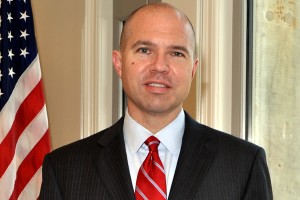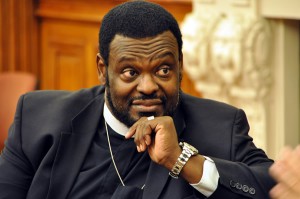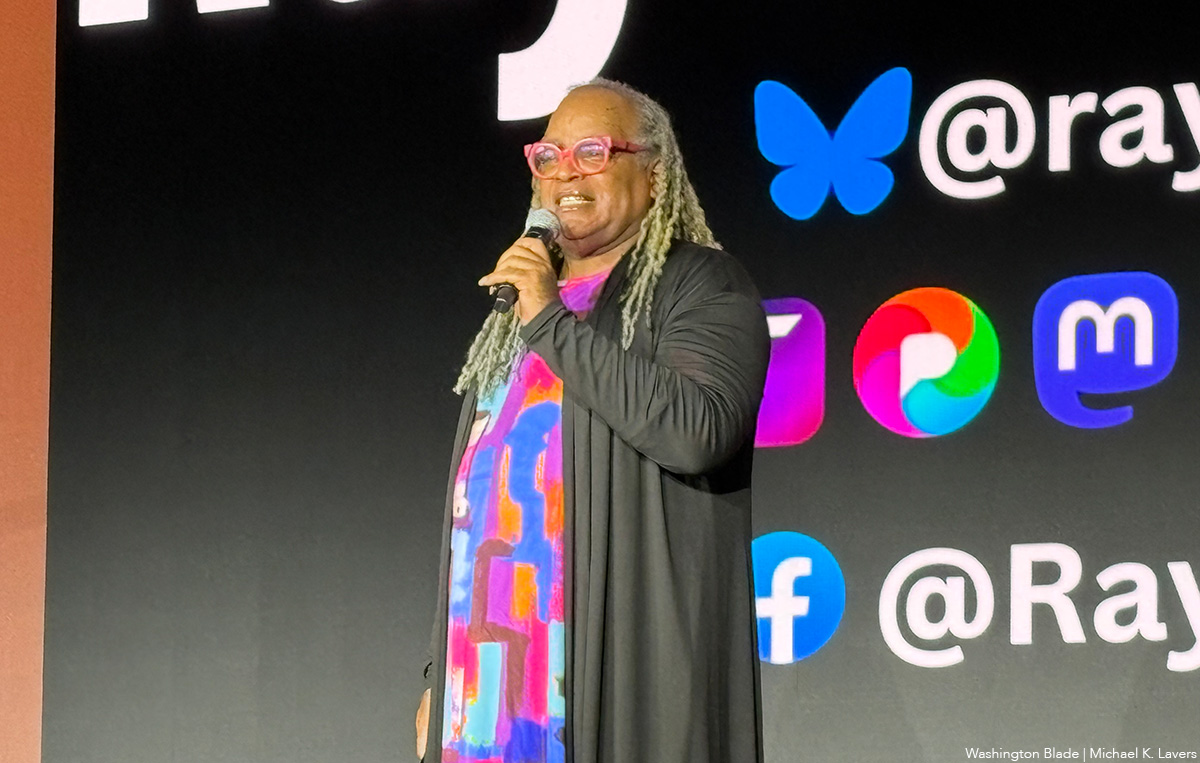Local
Council casts ‘historic’ vote for marriage

D.C. Council member David Catania thanked those on both sides of the marriage debate for conducting a ‘civil discussion’ of the issue. (DC Agenda photo by Michael Key)
The D.C. City Council on Tuesday voted 11-2 to give preliminary approval to a bill that would allow same-sex marriages to be performed in the city.
Council members backing the bill said its overwhelming support on the 13-member Council means it would sail through its required second-reading vote set for Dec. 15, sending it to Mayor Adrian Fenty for his signature. Fenty has pledged to sign the measure.
“It’s a day I never thought I would see and never thought I would have the privilege to participate in as a gay person,” said Council member David Catania (I-At Large), the bill’s author, during the Council’s 40-minute debate on the measure.
“And I want to thank, again, everyone on both sides of this discussion who, by and large, engaged in an extraordinarily civil discussion on what is a difficult matter for many,” Catania said.
Council member and former mayor Marion Barry (D-Ward 8) and Council member Yvette Alexander (D-Ward 7) were the only ones to vote against the bill. Alexander didn’t speak during the debate.
Barry noted his long record of support for LGBT rights during his 39-year tenure in D.C. politics as school board president, mayor and Council member, saying same-sex marriage was the only issue in which he has not been in lock step with the gay community.
“I am firm in my commitment to this community,” he said. “But I’m going to vote no because my conscience says so and because the majority of my constituents say so.”
Those voting for the bill were Council Chair Vincent Gray (D-At Large), and Council members Jim Graham (D-Ward 1), Jack Evans (D-Ward 2), Mary Cheh (D-Ward 3), Muriel Bowser (D-Ward 4), Harry Thomas Jr. (D-Ward 5), Tommy Wells (D-Ward 6), Phil Mendelson (D-At Large), Kwame Brown (D-At Large) and Michael Brown (I-At Large).
“This bill is the next step, a logical step, in the progress we have made in significantly expanding our domestic partnership law over the last 17 years,” said Phil Mendelson, chair of the Committee on Public Safety & Judiciary, which shepherded the bill through the Council.
“I don’t think it’s a giant step,” he said. “It’s a final step in a process in a steady march since 1992 as the District of Columbia, as a matter of public policy, has proceeded toward full equality regardless of marital status or sexual orientation.”
The Council chamber was not quite full as members debated and voted on the marriage bill, a development that surprised news reporters and Council staff members. Some had expected the turnout to be similar to the overflowing show among gay rights supporters and a raucous crowd of opponents during the Council’s spring vote on a separate bill that called for legally recognizing in D.C. same-sex marriages performed in other states and countries.
That measure passed by a similarly lopsided margin, with Barry emerging as the only Council member to vote against it. It cleared its required congressional review in July, becoming law July 7.
A coalition of LGBT organizations and mainline civil rights groups viewed the earlier measure as a trial run for the full same-sex marriage bill that the Council passed on first reading this week.
Bishop Harry Jackson, pastor of Hope Christian Church in Beltsville, Md., and leader of a coalition of social conservative and Christian groups opposed to same-sex marriage, watched the Council’s vote Tuesday from a front-row seat in the audience.
He told reporters after the vote that his coalition would continue to urge Congress to step in to overturn the same-sex marriage law. He said he and his supporters also would continue their court challenge of a D.C. Board of Elections & Ethics decision in October that refused to place on the ballot a voter initiative seeking to ban same-sex marriage in the District.
The board concluded that an initiative banning gay marriage would violate the city’s Human Rights Act, which prohibits discrimination based on sexual orientation. Jackson filed suit in D.C. Superior Court seeking to overturn the election board’s action. He has said he would appeal the case all the way to the U.S. Supreme Court if he and his backers lose in lower courts.
“Our desire is to let the people vote,” he told reporters after the Council’s approval of the marriage measure Tuesday.

Bishop Harry Jackson, leader of a coalition of conservative and Christian groups opposed to same-sex marriage, watched the Council’s vote Tuesday from a front-row seat. (DC Agenda photo by Michael Key)
“It’s clear that the other side in D.C. has been organized, has been systematic,” he said. “They dotted all their I’s and crossed all their T’s and, in a sense, this battle today was won two-and-a-half, three years ago by folks lobbying behind the scenes. The people have not had a chance to weigh in as of yet.”
Jackson and Barry have said they believe a majority of D.C. residents — particularly African-American residents — oppose same-sex marriage and are upset with the Council’s action on the issue.
But Michael Crawford, chair of same-sex marriage advocacy group D.C. for Marriage, disputed Jackson and Barry’s assessment of voter sentiment in the city.
“I am African American, there are a lot of folks working on marriage equality who are African American, there are a lot of straight African Americans who are supporting marriage equality,” Crawford said. “And the majority of African-American members of the City Council voted for marriage equality.
“Today is an amazingly historic day,” he said. “The City Council voted overwhelmingly to end discrimination against gay and lesbian families. They have stated without hesitation that they believe gay and lesbian families should not be treated as second-class citizens in the District.”
D.C. gay activist Bob Summersgill, who has coordinated same-sex couples’ rights issues in the city, including efforts to pass domestic partnership legislation, called the Council’s approval of a gay marriage bill the last major hurdle in providing equal rights for gays.
“I’m thrilled that the last major place in the law where we aren’t equal is being amended,” he said. “So now the promise of full equality under the law is being provided.”
Summersgill’s comment picked up on a theme sounded by gay D.C. Council member Jim Graham during the Council’s debate Tuesday on the marriage bill. Graham noted that on the heels of the Council’s actions in the 1970s to include gays in the Human Rights Act, which bans discrimination in employment, housing and public accommodations, the Council in the early 1990s began approving a series of measures to provide rights to same-sex couples.
He noted that the protections focused on domestic partnership amendments, beginning with the first domestic partnership bill approved by the Council in 1992. Graham said a steady stream of LGBT-related measures followed, including non-discrimination protections for transgender residents.
“I have been privileged to be on this Council for almost 11 years,” Graham said. “And the times that I have been most privileged to be here have been the times when this Council has acted to enhance and to protect human rights.”
Mendelson said he and Catania sought to reach a compromise with the Catholic Archdiocese of Washington, which has called for expanding the bill’s religious exemption clause.
The bill exempts religious institutions and clergy from having to perform same-sex marriages or make their facilities, products or services available for such marriages if doing so is contrary to their religious beliefs.
Archdiocesan officials asked the Council to go further by exempting one of their charitable entities, Catholic Charities, from having to provide employee benefits to the same-sex married partners of their workers providing services to needy residents under city contracts.
Mendelson said he and Catania met with Catholic Charities representatives Monday to determine if the group would back down on its threat to withdraw from city contracts providing services to as many as 68,000 people, including operation of homeless shelters, unless the Council grants it the employee benefits exemption.
“It’s their choice,” Mendelson said after the Council vote, in discussing whether Catholic Charities withdraws from city contracts.
Mendelson said he and Catania, with the backing of other Council members, declined to add language to the marriage bill allowing the group to withhold employee benefits for same-sex married partners of their employees because doing so would be a violation of the D.C. Human Rights Act.
Mendelson said he and Catania remain open to discussing other options for Catholic Charities during the two-week interval between Tuesday’s first-reading vote on the marriage bill and the final vote Dec. 15.
Wells noted during Council debate on the marriage bill that the city has access to other vendors and contractors who would step in to replace Catholic Charities.
“There’s Lutheran Social Services, Methodist Board of Child Care, Family Matters, D.C. Family Child Services, Pathways to Housing,” said Wells in naming some of the groups that provide similar services.
“They do not ask to be exempt from any D.C. laws,” he said. “Choosing to be a contractor to serve functions in the District of Columbia is not a right. You’re part of a bidding process.”
Susan Gibbs, an Archdiocese of Washington spokesperson, said after the vote that archdiocesan officials also look forward to a “continuing dialogue” with Council members over the issue.
“Catholic Charities has been here for 80 years,” she said. “The archdiocese, the Catholic Church, has been here since before there was a City Council. So we’re committed to continue doing the services we can with the resources we have. We’re not stopping providing services.”
Thomas told his colleagues during Tuesday’s debate that his Ward 5 constituents were “torn down the middle” on the gay marriage issue. He said he recognizes the strong religious beliefs of many of his constituents, but decided to vote for the bill on grounds of human rights to help ensure equality under the law.
“As a legislator, I cannot allow my personal preferences or my religious practices, or anything that in my personal life, that would allow the disenfranchisement of any individual in the District of Columbia,” he said.
Virginia
McPike wins special election for Va. House of Delegates
Gay Alexandria City Council member becomes 8th LGBTQ member of legislature

Gay Alexandria City Council member Kirk McPike emerged as the decisive winner in a Feb. 10 special election for a seat in the Virginia House of Delegates representing Alexandria.
McPike, a Democrat, received 81.5 percent of the vote in his race against Republican Mason Butler, according to the local publication ALX Now.
He first won election to the Alexandria Council in 2021. He will be filling the House of Delegates seat being vacated by Del. Elizabeth Bennett-Parker (D-Alexandria), who won in another Feb. 10 special election for the Virginia State Senate seat being vacated by gay Sen. Adam Ebbin (D-Alexandria).
Ebbin is resigning from his Senate this week to take a position with Virginia Gov. Abigail Spanberger’s administration.
Upon taking his 5th District seat in the House of Delegate, McPike will become the eighth out LGBTQ member of the Virginia General Assembly. Among those he will be joining is Sen. Danica Roem (D-Manassas), who became the Virginia Legislature’s first transgender member when she won election to the House of Delegates in 2017 before being elected to the Senate in 2023.
“I look forward to continuing to work to address our housing crisis, the challenge of climate change, and the damaging impacts of the Trump administration on the immigrant families, LGBTQ+ Virginians, and federal employees who call Alexandria home,” McPike said in a statement after winning the Democratic nomination for the seat in a special primary held on Jan. 20.
McPike, a longtime LGBTQ rights advocate, has served for the past 13 years as chief of staff for gay U.S. Rep. Mark Takano (D-Calif.) and has remained in that position during his tenure on the Alexandria Council. He said he will resign from that position before taking office in the House of Delegates.
Local
Local LGBTQ groups, activists to commemorate Black History Month
Rayceen Pendarvis to moderate Dupont Underground panel on Sunday

LGBTQ groups in D.C. and elsewhere plan to use Black History Month as an opportunity to commemorate and celebrate Black lives and experiences.
Team Rayceen Productions has no specific events planned, but co-founder Rayceen Pendarvis will attend many functions around D.C. this month.
Pendarvis, a longtime voice in the LGBTQ community in D.C. moderated a panel at Dupont Underground on Feb. 8. The event, “Every (Body) Wants to Be a Showgirl,” will feature art from Black burlesque artists from around the country. Pendarvis on Feb. 23 will attend the showing of multimedia play at the Lincoln Theatre that commemorates the life of James Baldwin.
Equality Virginia plans to prioritize Black voices through a weekly online series, and community-based story telling. The online digital series will center Black LGBTQ voices, specifically trailblazers and activists, and contemporary Black queer and transgender people.
Narissa Rahaman, Equality Virginia’s executive director, stressed the importance of the Black queer community to the overall Pride movement, and said “Equality Virginia is proud to center those voices in our work this month and beyond.”
The Capital Pride Alliance, which hosts Pride events in D.C., has an alliance with the Center for Black Equity, which brings Black Pride to D.C. over Memorial Day weekend. The National LGBTQ Task Force has no specific Black History Month events planned, but plans to participate in online collaborations.
Cathy Renna, the Task Force’s director of communications, told the Washington Blade the organization remains committed to uplifting Black voices. “Our priority is keeping this at the forefront everyday,” she said.
The D.C. LGBTQ+ Community Center is also hosting a series of Black History Month events.
The D.C. Public Library earlier this year launched “Freedom and Resistance,” an exhibition that celebrates Black History Month and Martin Luther King Jr. It will remain on display until the middle of March at the Martin Luther King Jr. Memorial Library at 901 G St., N.W.
District of Columbia
U.S. Attorney’s Office drops hate crime charge in anti-gay assault
Case remains under investigation and ‘further charges’ could come

D.C. police announced on Feb. 9 that they had arrested two days earlier on Feb. 7 a Germantown, Md., man on a charge of simple assault with a hate crime designation after the man allegedly assaulted a gay man at 14th and Q Streets, N.W., while using “homophobic slurs.”
But D.C. Superior Court records show that prosecutors with the Office of the U.S. Attorney for D.C., which prosecutes D.C. violent crime cases, charged the arrested man only with simple assault without a hate crime designation.
In response to a request by the Washington Blade for the reason why the hate crime designation was dropped, a spokesperson for the U.S. Attorney’s office provided this response: “We continue to investigate this matter and make no mistake: should the evidence call for further charges, we will not hesitate to charge them.”
In a statement announcing the arrest in this case, D.C. police stated, “On Saturday, February 7, 2026, at approximately 7:45 p.m. the victim and suspect were in the 1500 block of 14th Street, Northwest. The suspect requested a ‘high five’ from the victim. The victim declined and continued walking,” the statement says.
“The suspect assaulted the victim and used homophobic slurs,” the police statement continues. “The suspect was apprehended by responding officers.”
It adds that 26-year-old Dean Edmundson of Germantown, Md. “was arrested and charged with Simple Assault (Hate/Bias).” The statement also adds, “A designation as a hate crime by MPD does not mean that prosecutors will prosecute it as a hate crime.”
Under D.C.’s Bias Related Crime Act of 1989, penalties for crimes motivated by prejudice against individuals based on race, religion, sexual orientation, gender identity, disability, and homelessness can be enhanced by a court upon conviction by one and a half times greater than the penalty of the underlying crime.
Prosecutors in the past both in D.C. and other states have said they sometimes decide not to include a hate crime designation in assault cases if they don’t think the evidence is sufficient to obtain a conviction by a jury. In some instances, prosecutors have said they were concerned that a skeptical jury might decide to find a defendant not guilty of the underlying assault charge if they did not believe a motive of hate was involved.
A more detailed arrest affidavit filed by D.C. police in Superior Court appears to support the charge of a hate crime designation.
“The victim stated that they refused to High-Five Defendant Edmondson, which, upon that happening, Defendant Edmondson started walking behind both the victim and witness, calling the victim, “bald, ugly, and gay,” the arrest affidavit states.
“The victim stated that upon being called that, Defendant Edmundson pushed the victim with both hands, shoving them, causing the victim to feel the force of the push,” the affidavit continues. “The victim stated that they felt offended and that they were also gay,” it says.



















